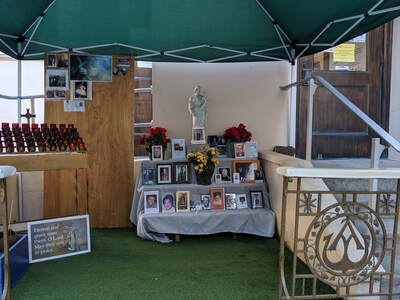 Our All Souls Altar, which will remain set up (outside this year) throughout the month of November
Our All Souls Altar, which will remain set up (outside this year) throughout the month of November All Hallows Eve, All Saints Day, and All Souls Day form a kind of November Triduum helping us understand “sister death.” 3000 years ago the Greek poet Homer lamented “hateful old age” and “miserable death.” The book of Ecclesiastes also describes death in melancholic poetry, but without that sense of final absurdity: “the silver cord is snapped, the golden bowl is broken, the pitcher is shattered at the spring, the pulley is broken at the well, the dust returns to the earth as it once was, and the life breath returns to God who gave it.” Our “passing” is not just a passing away, but a passing into God. The autumn triduum of October 31, November 1, and November 2 point to a truth deeper than death: our life breath will return to God, who gave it.
Those of us who still live on this side of the grave are only the smallest fraction of the living. We make up the Church Militant, those in daily combat against the destructive powers of the world, the flesh, and the devil. But above us, below us, and all around us a great multitude fills the air. The saints in heaven (the Church Triumphant), and the holy souls in purgatory (the Church Suffering), have entered into real life, and we are shadows compared to them. We are the ghosts; they are the living. “After this,” St. John writes in our first reading, “I saw a great multitude, which no one could count, from every nation, race, people, and tongue.” We believe in the other two worlds, and we depend on the strength of their intercession, even as we intercede for the souls in purgatory.
Purity of Heart
Death is certainly a horror, and our curious celebration of bodily purification on October 31st is perhaps an attempt to laugh it off. The carnal impurity of death, however, is only a consequence and manifestation of spiritual impurity. Before sin, there was no death, and after sin, there will be no death. Who are these, asks St. John in the Apocalypse, wearing white robes? The angel replies: “These are the ones who have washed their robes and made them white in the blood of the Lamb.” We hope that one day we will be so washed, that the sadness of sin will never again touch us. “Everyone who has this hope based on Him,” writes St. Paul in the Epistle, “makes himself pure, as He is pure.” Simply to believe in God’s grace, and to hope in our perfect sanctification, is to be made pure. Jesus directs us to this purity in the eight beatitudes: poverty of spirit, meekness, thirst for righteousness, and cleanness of heart. Only the pure of heart can see God, and only the pure can see the beauty and goodness of God’s image in others. The pornography epidemic, for example, ruins human relationships, especially marriages, because one addicted to pornography can no longer see God’s image in other people, or even in himself. To the impure, all things are impure, but to the pure all things are pure. Holiness is first and foremost purity of heart.
One-Issue Voters?
Even politics, which we have come to regard as a dirty business, is pure to the pure of heart. The general election on Tuesday is a sacred moment, an act of virtue and means of sanctification, to those who have washed their robes in the blood of the Lamb. We do not vote for one man or even one platform against another, but we either vote for the laws of nature, and of nature’s God, or we vote against Him. I would like to finish with part of an interview the Archbishop gave to Phil Lawler at Catholic World News last week. He speaks of one issue in particular, and many say Catholics are not “one issue voters.” Well, that depends on what the issue is. Certainly no one today would deny that in 1864, when the issue was slavery, it would be wrong to vote on that one issue. If the issue is so blatantly evil that it compromises the entire presidency, we must be “one issue voters.”
“Each voter,” Archbishop Cordileone said, “is going to have to decide based on their conscience whom they vote for. Part of the decision-making process, though, must consider not just the candidate but the platform the candidate’s party presents. There are elements in both Democratic and Republican platforms that Catholics can object to, and this will always be the case.
“But abortion is a special issue. It is the only case in which our government openly says: this human life has no rights, no value at all. Right now, we as a society abandon both the babies and the mothers in these troubled pregnancies. It’s hard for me personally to see how a faithful Catholic in good conscience can vote for a candidate who supports laws advancing the right to kill unborn babies…. Up to a million babies a year are being killed in their mother’s womb in this country alone, and just about the only ones trying to help those scarred by the experience to heal are people of faith. Likewise for those doing something practical to offer women real alternatives to abortion. No one else. There are not too many things I can think of that are more blatantly evil than that.”
Thank you, Archbishop Cordileone, for that clarity. Life often requires decisions between imperfect goods, or between the lesser of two evils. I’m quite sure that such a decision is before Americans at this time. In the end, we cannot be merely Catholics. We must be saints.


 RSS Feed
RSS Feed